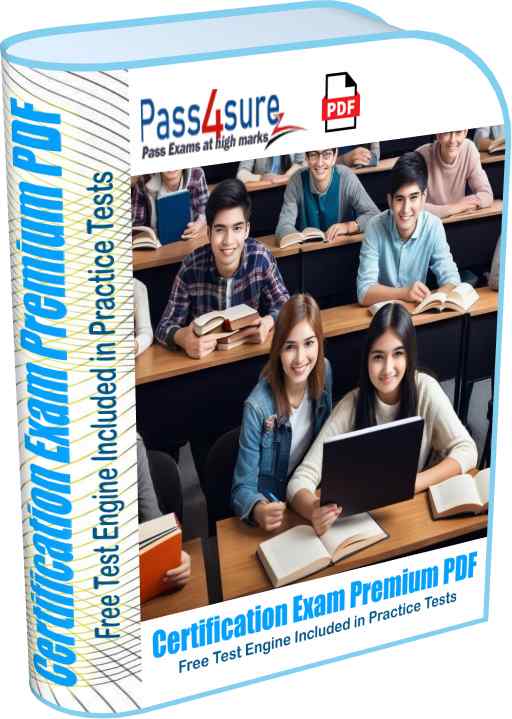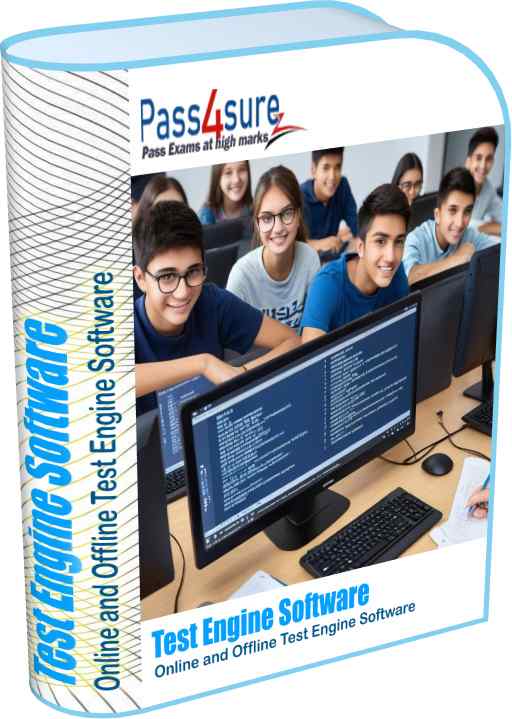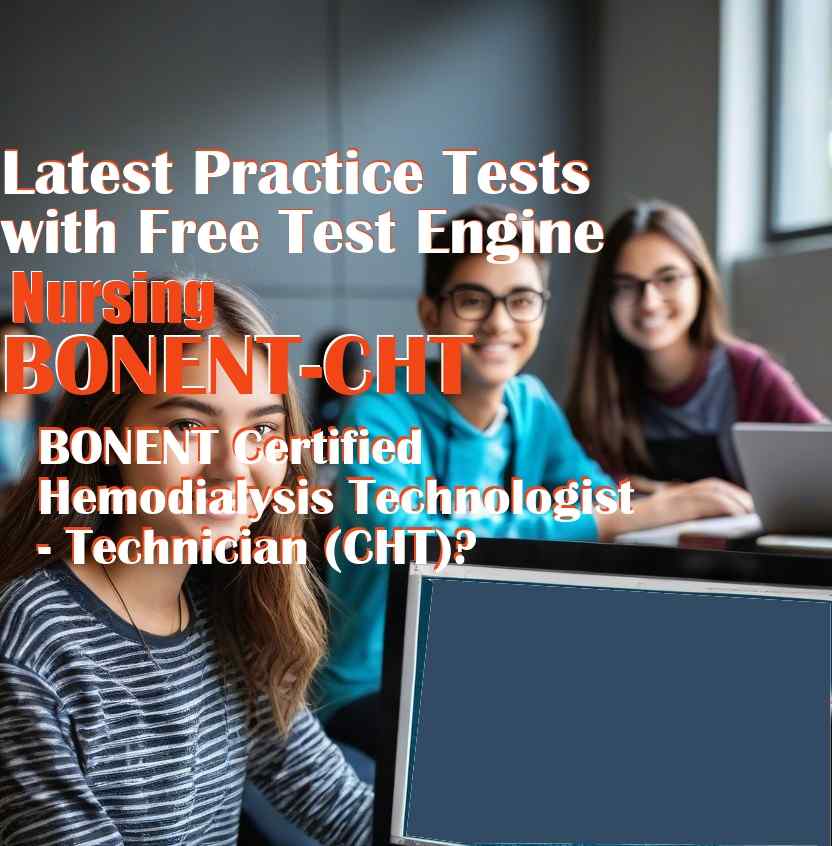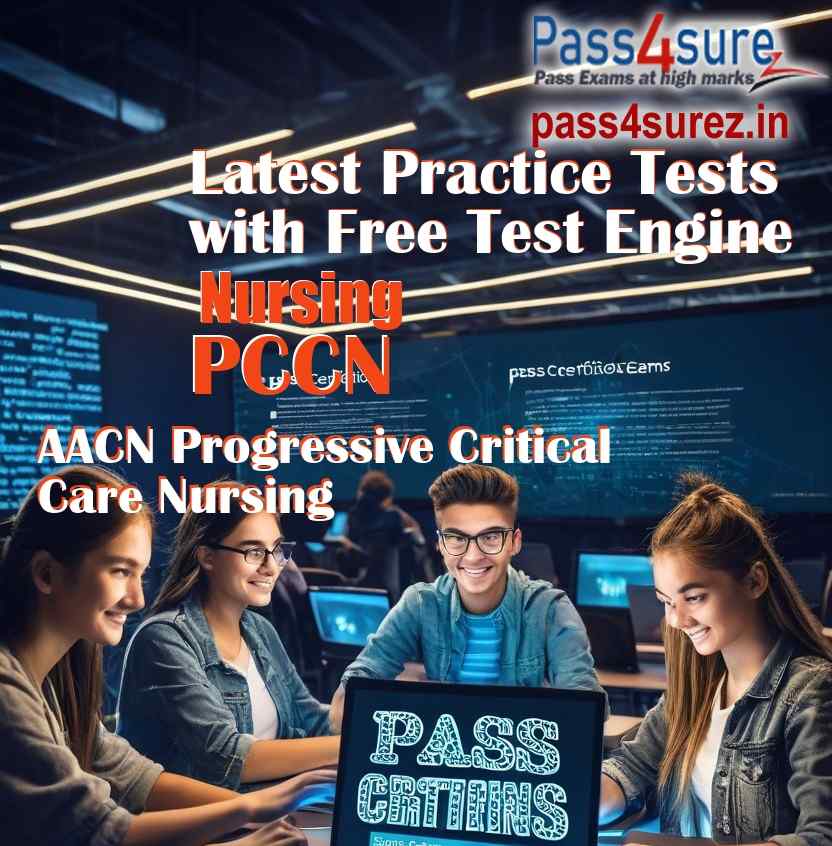| Exam Code | PCCN |
| Questions and Answers | 89 |
| Premium Access | Yes |
| Online Test Engine | Yes |
| Comprehensive Q&A | Yes |
| Success Rate | 98% |
| Real Questions | Yes |
| Updated Regularly | Yes |
| Portable Files | ✔ |
| Unlimited Download | ✔ |
| 100% Secured | ✔ |
| Confidentiality | 100% |
| Success Guarantee | 100% |
| Any Hidden Cost | $0.00 |
| Auto Recharge | No |
| Updates Intimation | by Email |
| Technical Support | Free |
| PDF Compatibility | Windows, Android, iOS, Linux |
| Test Engine Compatibility | Mac/Windows/Android/iOS/Linux |
| Sample Questions |  |
Pass4sure Practice Tests are an effective way to prepare for the PCCN exam. The practice tests include premium PDF and Test Engine Software. Pass4surez.in provides an extensive question bank to improve your knowledge and help you achieve high marks on the PCCN exam.
The AACN Progressive Critical Care Nursing exam questions and answers on Pass4surez.in are regularly verified and updated to ensure they reflect the latest syllabus and topics covered in the real test. The certification exams and entry test exams from pass4surez.com make you familiar with the test environment. The goal is to enhance your knowledge of the PCCN exam and enable you to pass it on your first attempt.
The PDF of PCCN exam questions and answers provided by Pass4surez.in contains a comprehensive pool of questions and verified answers, including references and explanations where applicable. The objective is not only to help you pass the exam, but also to significantly improve your knowledge of the latest PCCN course topics.
 |
|
CERTIFICATION EXAM PREMIUM PDF
Pass4Sure provide premium PDF that contains all the questions and answers that are necessary to make your concepts about the exam topics clear and boost your knowledge about the exam. These questions and answers make you ready to face actual test in test centers. Our team keep on revising material and update the exam questions accordingly. You will feel confident in test center. Our support team keep on helping our customers to make their testing experience best. Our premium PDF files are searchable, convertable and printable at high quality to make book that you can study during traveling or during vacations. Our automated system sends intimation email to our customers on each update. The files in customer download section is overwritten with latest pdf files.
|
| |
|
 |
|
CERTIFICATION EXAM TEST ENGINE
Pass4sure test engine is best certification and examination preparation tool that help you make yourself ready to take the actual exam and get high marks in the exam. Our OTE (Online Test Engine) support all OS Platforms including iOS, Android, Windows, Linux, Chromebook etc and provide up to date experience to get ready for actual test. Our Offline Test Engine is compatible to all windows platforms including latest windows versions. Our test engines helps to familiarize actual test environment and makes you ready to take timed tests. Your performance history and graphs helps you to see when you are ready to sit in actual exam in test center. These test engines uses up to date and latest questions and answers, keeps on updating the questions pool and sends you intimation on each update.
|
Pass4sure Premium PDF and Test Engines support all platforms and devices including mobile devices and computers. You should download sample PDF and Test Engine to evaluate the product before you buy the full version. Our exam samples include some questions that may be or may not be up to date but full version is always up to date.
The PCCN and PCCN-K certification exams focus 80 percent on clinical judgment and 20 percent on professional caring and ethical practice. Our comprehensive course prepares you in the following categories:
Clinical Judgment
- Cardiovascular
- Pulmonary
- Endocrine
- Hematology
- Gastrointestinal
- Renal
- Neurology
- Behavioral/Psychosocial
- Musculoskeletal
- Professional Caring and Ethical Practice
- Advocacy/Moral Agency
- Caring Practices
- Response to Diversity
- Facilitation of Learning
- Collaboration
- Systems Thinking
- Clinical Inquiry
- Learning Outcomes
At the completion of this learning activity, participants should be able to:
Validate their knowledge of progressive care nursing Briefly review the pathophysiology of single and multisystem dysfunction in adult patients and the medical and pharmacologic management of each Identify the progressive care nursing management needs for adult patients with single or multisystem organ abnormalities Successful Completion
Learners must complete 100 percent of the activity and the associated evaluation to be awarded the contact hours or CERP. No partial credit will be awarded.
12.8 contact hours awarded, CERP Category A
Exam Eligibility
Are you eligible to take the PCCN or PCCN-K exam? Eligibility requirements and links to handbooks with test plans are available on our “Get Certified” pages — click here to get started: PCCN (Adult) or PCCN-K (Adult) .
PCCN and PCCN-K certifications emphasize the knowledge that the progressive nursing specialty requires and the essential acute care nursing practices that you can apply in your role every day in a step-down unit, emergency or telemetry department or another progressive care environment.
PCCN and PCCN-K specialty certifications also demonstrate your knowledge and dedication to hospital administrators, peers and patients, while giving you the satisfaction of your achievement. PCCN and PCCN-K credentials are granted by AACN Certification Corporation.
Validate and enhance your knowledge and improve patient outcomes. Take advantage of this detailed review course and earn your PCCN or PCCN-K certification.
The American Association of Critical-Care Nurses (AACN) is accredited as a provider of continuing nursing education by the American Nurses Credentialing Centers (ANCC's) Commission on Accreditation, ANCC Provider Number 0012. AACN has been approved as a provider of continuing education in nursing by the California Board of Registered Nursing (CBRN), Provider number CEP 1036. This activity is approved for 12.8 contact hours.
AACN programming meets the standards of most states that require mandatory CE contact hours for license and/or certification renewal. AACN recommends consulting with your state board of nursing or credentialing organization before submitting CE to fulfill continuing education requirements.
AACN and AACN Certification Corporation consider the American Nurses Association (ANA) Code of Ethics for Nurses foundational for nursing practice, providing a framework for making ethical decisions and fulfilling responsibilities to the public, colleagues and the profession. AACN Certification Corporations mission of public protection supports a standard of excellence where certified nurses have a responsibility to read about, understand and act in a manner congruent with the ANA Code of Ethics for Nurses.
I. CLINICAL JUDGMENT (80%)
A. Cardiovascular (27%)
1. Acute coronary syndromes
a. non-ST segment elevation myocardial infarction
b. ST segment elevation myocardial infarction
c. unstable angina
2. Acute inflammatory disease (e.g., myocarditis, endocarditis, pericarditis)
3. Aneurysm
a. dissecting
b. repair
4. Cardiac surgery (e.g., post ICU care)
5. Cardiac tamponade
6. Cardiac/vascular catheterization
a. diagnostic
b. interventional
7. Cardiogenic shock
8. Cardiomyopathies
a. dilated (e.g., ischemic/non-ischemic)
b. hypertrophic
c. restrictive
9. Dysrhythmias
10. Heart failure
a. acute exacerbations (e.g., pulmonary edema)
b. chronic
11. Hypertension (uncontrolled)
12. Hypertensive crisis
13. Minimally-invasive cardiac surgery (i.e. nonsternal approach)
14. Valvular heart disease
15. Vascular disease
B. Pulmonary (17%)
1. Acute respiratory distress syndrome (ARDS)
2. Asthma (severe)
3. COPD exacerbation
4. Minimally-invasive thoracic surgery (e.g., VATS)
5. Obstructive sleep apnea
6. Pleural space complications (e.g., pneumothorax, hemothorax, pleural effusion, empyema, chylothorax)
7. Pulmonary embolism
8. Pulmonary hypertension
9. Respiratory depression (e.g., medicationinduced, decreased-LOC-induced)
10. Respiratory failure
a. acute
b. chronic
c. failure to wean
11. Respiratory infections (e.g., pneumonia)
12. Thoracic surgery (e.g., lobectomy, pneumonectomy)
C. Endocrine/Hematology/Neurology/Gastrointestinal/Renal (20%)
1. Endocrine
a. diabetes mellitus
b. diabetic ketoacidosis
c. hyperglycemia
d. hypoglycemia
2. Hematology/Immunology/Oncology
a. anemia
b. coagulopathies: medication-induced (e.g., Coumadin, platelet inhibitors, heparin [HIT])
3. Neurology
a. encephalopathy (e.g., hypoxic-ischemic, metabolic, infectious, hepatic)
b. seizure disorders
c. stroke
4. Gastrointestinal
a. functional GI disorders (e.g., obstruction, ileus, diabetic gastroparesis, gastroesophageal reflux, irritable bowel syndrome)
b. GI bleed
i. lower
ii. upper
c. GI infections (e.g., C. difficile)
d. GI surgeries (e.g., resections, esophagogastrectomy, bariatric)
e. hepatic disorders (e.g., cirrhosis, hepatitis, portal hypertension)
f. ischemic bowel
g. malnutrition (e.g., failure to thrive, malabsorption disorders)
h. pancreatitis
5. Renal
a. acute kidney injury (AKI)
b. chronic kidney disease (CKD)
c. electrolyte imbalances
d. end-stage renal disease (ESRD)
D. Musculoskeletal/Multisystem/Psychosocial (16%)
1. Musculoskeletal
a. functional issues (e.g., immobility, falls, gait disorders)
2. Multisystem
a. end of life
b. healthcare-acquired infections
i. catheter-associated urinary tract infections (CAUTI)
ii. central-line-associated bloodstream infections (CLABSI)
iii. surgical site infection (SSI)
c. infectious diseases
i. influenza
ii. multidrug-resistant organisms (e.g., MRSA, VRE, CRE, ESBL)
d. pain
i. acute
ii. chronic
e. palliative care
f. pressure injuries (ulcers)
g. rhabdomyolysis
h. sepsis
i. shock states
i. anaphylactic
ii. hypovolemic
j. toxic ingestion/inhalation/drug overdose
k. wounds (e.g., infectious, surgical, trauma)
3. Behavioral/Psychosocial
a. altered mental status
b. delirium
c. dementia
d. disruptive behaviors, aggression, violence
e. psychological disorders
i. anxiety
ii. depression
f. substance abuse
i. alcohol withdrawal
ii. chronic alcohol abuse
iii. chronic drug abuse
iv. drug-seeking behavior
v. drug withdrawal
II. PROFESSIONAL CARING AND ETHICAL PRACTICE (20%)
A. Advocacy/Moral Agency
B. Caring Practices
C. Response to Diversity
D. Facilitation of Learning
E. Collaboration
F. Systems Thinking
G. Clinical Inquiry Cardiovascular
• Identify, interpret and monitor
o dysrhythmias
o QTc intervals
o ST segments
• Manage patients requiring
o ablation
o arterial closure devices
o arterial/venous sheaths
o cardiac catheterization
o cardioversion
o defibrillation
o pacemakers
o percutaneous coronary intervention (PCI)
o transesophageal echocardiogram (TEE)
• Monitor hemodynamic status and recognize signs and symptoms of hemodynamic instability
• Select leads for cardiac monitoring for the indicated disease process
• Titrate vasoactive medications
o Dobutamine
o Dopamine
o Nitroglycerin Pulmonary
• Interpret ABGs
• Maintain airway
• Monitor patients pre and post
o bronchoscopy
o chest tube insertion
o thoracentesis
• Manage patients requiring mechanical ventilation
• Manage patients requiring non-invasive O2 or ventilation delivery systems
o BiPAP
o CPAP
o face masks
o high-flow therapy
o nasal cannula
o non-breather mask
o venti-masks
• Manage patients requiring respiratory monitoring devices:
o continuous SpO2
o end-tidal CO2 (capnography)
Manage patients requiring tracheostomy tubes
• Manage patients with chest tubes (including pleural drains)
• Recognize respiratory complications and initiate interventions
Endocrine/Hematology/Neurology/Gastrointestinal/Renal
• Endocrine
o manage and titrate insulin infusions
• Hematology/Immunology/Oncology
o administer blood products and monitor patient response
• Neurology
o perform bedside screening for dysphagia
o use NIH Stroke Scale (NIHSS)
• Gastrointestinal
o manage patients pre- and post-procedure (e.g., EGD, colonoscopy)
o manage patients who have fecal containment devices
o manage patients who have tubes and drains
o recognize indications for and complications of enteral and parenteral nutrition
• Renal
o identify medications that can be removed during dialysis
o identify medications that may cause nephrotoxicity
o initiate renal protective measures for nephrotoxic procedures
o manage patients pre- and post-hemodialysis Musculoskeletal/Multisystem/Psychosocial
• Musculoskeletal
o initiate and monitor progressive mobility measures
• Multisystem
o administer medications for procedural sedation and monitor patient response
o differentiate types of wounds, pressure injuries
o manage patients with complex wounds (e.g., fistulas, drains and vacuum-assisted closure devices)
o manage patients with infections
• Psychosocial
o implement suicide prevention measures
o screen patients using a delirium assessment tool (e.g., CAM)
o use alcohol withdrawal assessment tools (e.g., CIWA)
General
• Administer medications and monitor patient response
• Anticipate therapeutic regimens
• Monitor diagnostic test results
• Perform an assessment pertinent to the system
• Provide health promotion interventions for patients, populations and diseases
• Provide patient and family education unique to the clinical situation
• Recognize procedural and surgical complications
• Recognize urgent situations and initiate interventions
• Use complementary alternative medicine techniques and non-pharmacologic interventions
You can download a free PDF of the PCCN practice test and study guide to try before purchasing the premium files. To ace the exam, simply download the PCCN exam questions and answers file, memorize the content, and practice with the VCE Exam Simulator. This will ensure you are fully prepared for the real test.
The PCCN PDF practice test and exam questions and answers can be accessed on any device, including iPhone, iPad, Android, and Windows. You can download the PDF to your computer or any other device and start studying. Additionally, you can download and install the VCE Exam Simulator for further practice. The PCCN PDF is printable in high quality, allowing you to take it with you on vacations or while traveling. Your updated PCCN exam files can be accessed anytime from your online account, and you will receive your login credentials immediately after purchase.


